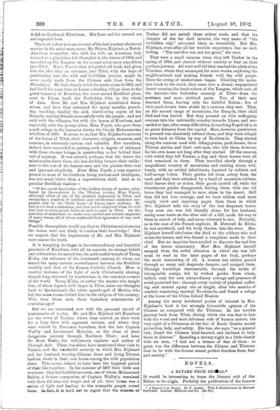NOVELS.
A BAYARD FROM BEM6A.L.* IT would be interesting to trace the literary cult of the Biboo to its origin. Probably the publication of the famous • A Bayard from Bengal. By P. Anstey. With Ilhultraticins by Ber.nard Partridge. Louden : Methuen and Co. Vs. 6c1.] Mookerjee brochure, so widely circulated amongst Anglo- Indians and their friends thirty or more years back, did more than anything else to familiarise the general public with a type of character which Mr. Anstey has of late delineated with such extraordinary skill and humour. The Baboo as he is revealed in print and paper, for lie is essentially a man of words and not of action, is the product of what the French call literaturitis working on a supple, loquacious, obsequious, complacent nature. He rapidly attains a remarkably fluent but inaccurate control of English, and his natural instinct for florid imagery induces him at every turn to interlard and embellish his dialogue or narrative with purple patches, mis- used quotations, and dictionary English. The Baboo always uses the last synonym. There was once a French governess who taught her charges by the excellent process of translation and retranslation. The lesson one day was based on a French fable relating to a vain little girl, over-much addicted to dress, and the carefully prepared English version of the French original described how "she leered at her fine clothes as she straddled down the street." That is precisely the method of the Baboo, as it is of any one with a florid taste who learns another language largely from books. Thus a curious resemblance to Baboo English again may be found in the exuberant phrases of the Irish peasantry, in poetry of the hedge-school. master type, or in the flights of the Irish reporter, who has been known to describe a fiddler as " Paganini's repre- sentative." Hence, although the great majority of the reading public may not have had any first-hand acquaintance with the Baboo, they are probably familiar enough with analogous types, apart from what they have read about him in books on India and in the Press, to appreciate the brilliant tour de force which Mr. Anstey has given us in A Bayard from Bengal.
The scope of the extravaganza, already familiar to readers of Punch, is indicated in the alternative title as an " account of the magnificent and spanking career of Chunder Bindabun Bhosh, Esq., B.A., Cambridge, by Hurry Bungsho Jabberjee, B.A., Calcutta University, author of Jottings and Tittlings,' &c." The adventures of Mr. Bhosh, " a. typically splendid representative of Young India on British soil," begin with his career at Cambridge, where his principal friend was a " young high-spirited aristocrat entitled Lord Jack Jolly, the only sou of an Earl who had lately been promoted to the dignity of a baronetcy," and where Lord Jolly and Mr. Bhosh soon became "as inseparable as a Daemon and a Pythoness." There he dis. tinguishes himself not only by the elegance of his hospitality and the garrulity of his conversation, but by his industry as well, "for he became a most exemplary bookworm, burning his midnight candle at both ends," and eventually winning the " greatest distinction the Vice-Chancellor could bestow upon him,—viz., the title of a Wooden Spoon." Mr. Bhosh's adven- tures, however, begin in earnest with the rescue of a distressed damsel from an infuriated cow, and his chequered courtship of the Princess Petunia Jones, though frustrated for a while by the machinations of the Duchess Dickinson, and involving him in a duel with Lord Jack Jolly, is at last crowned with success by his sensational victory at the Derby on his dark horse 'Milky Way.' Alike as a lover, a duellist, and a sportsman, Mr. Bhosh—who reminds us of the Winchester epitaph, ingenio tam laetua erat guam corpore obesus—is quite impayable, and the fun is greatly increased by the extremely clever illustrations in the Baboo style contributed by Mr. Bernard Partridge. The volume is completed with a collec- tion of fables entitled "The Parables of Piljosh," edited by Mr. Jabberjee. Here Mr. Anstey has had forerunners, but he holds his own in a genre rendered familiar by more than one American humourist. One of the best of his proverbs is the following: " There is but one singer whom it is futile to encore—and that is a Dying Swan." The collection is better to dip into than to read through from beginning to end. To do so is like dining off a succession of courses all composed of hors d'ceurre.







































 Previous page
Previous page